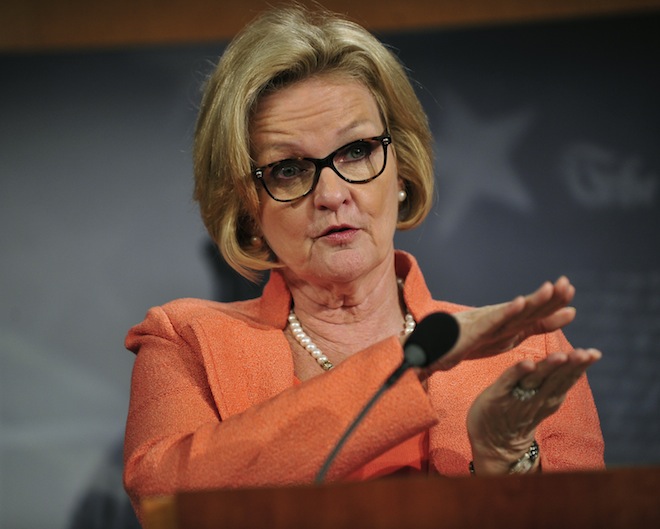Republicans leaders are lining up to blame failed Senate candidates Todd Akin and Richard Mourdock for dragging down the party with their comments on rape. But Democratic women say that their success this election cycle ran far deeper than one or two meltdowns.
And they have plenty to brag about this week. President Obama won re-election with strong support from female voters and the Senate will soon have more women than ever thanks to a number of hard fought victories by female candidates.
Not that a few high-profile disasters from Republicans didn’t help. Speaking at a post-election panel hosted by EMILY’s List on Wednesday morning, Sen. Claire McCaskill (D-MO) introduced herself as “the senator that brought you Todd Akin.”
Reflecting on her double-digit victory over Akin, McCaskill warned against attributing it to just his comments on “legitimate rape” and exceptions on abortion restrictions. Instead, it was a “whole list of things” that often included economic issues, including Akin’s vocal opposition to federal student loan aid and equal pay laws.
“We cannot get so focused on one issue that we lose sight of what the motivation is for most women: it’s about security, it’s about being the sole breadwinner and figuring out how they get their kids to college, its about working two or three jobs so they can get a car so they can get their kid to daycare without struggling to figure out the bus routes,” McCaskill said.
While they haven’t called for a shift in policy, Republicans have openly complained about Akin and Mourdock’s inability to discuss abortion without sparking a backlash. Former Bush adviser Karen Hughes said after the election that she wanted to “cut out” the tongue of the next GOP candidate to follow their lead. Louisiana Gov. Bobby Jindal, considered a potential presidential candidate, also spoke out against “offensive bizarre comments” from party members.
Dawn Laguens, executive president of Planned Parenthood, said the House GOP set the stage for its troubles with women long before Akin by devoting so much time after the midterms towards bills defunding Planned Parenthood and allowing businesses to deny contraception coverage to employees.
“I think it’s a critically important point, which is those guys were exclamation points at the very end of a platform diatribe against women,” Laguens said. “We can’t let the Republicans say ‘Hey, if we can just hide this –‘ I don’t want to hear about how you hide your views, I want you to change them.”
Ann Liston, a Democratic strategist who worked on Obama’s re-election, suggested that the election cycle was especially important in that it led younger women, who had assumed fights over abortion and contraception “that my mother and my aunts talk about” had been resolved, to devote new interest to the issue.
Liston told TPM her research during the campaign indicated that highlighting the party’s record on abortion actually helped Democrats with younger men in key House races as well, not just women.
“It was a shortcut to other issues: if they were extreme on women’s healthy it was easier to show they were extreme elsewhere,” Liston said. For Dr. Ami Bera’s challenge against Rep. Dan Lungren (D-CA), for example, she said the Democratic candidate ran ads about Lungren’s opposition to abortion even in cases of rape that were “targeted to everyone and their uncle — not just their sister.” That race has yet to be called, but Bera currently leads Lungren as votes are still being counted.






